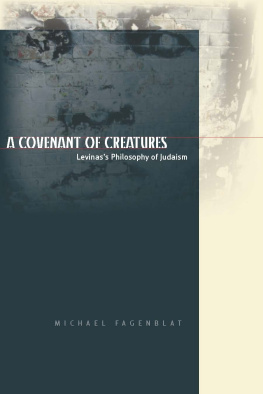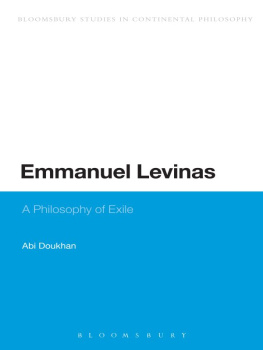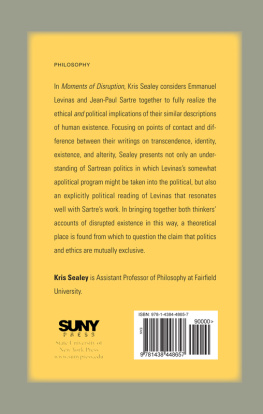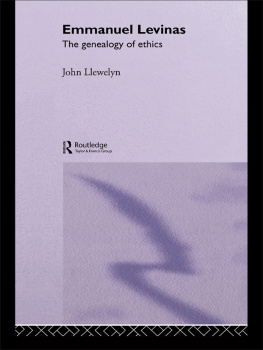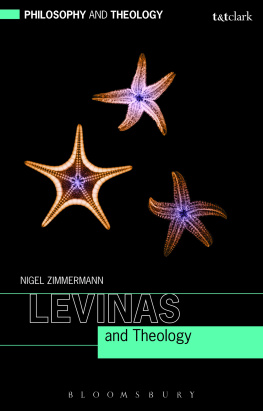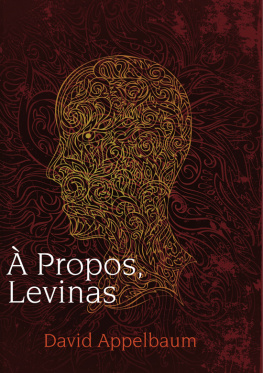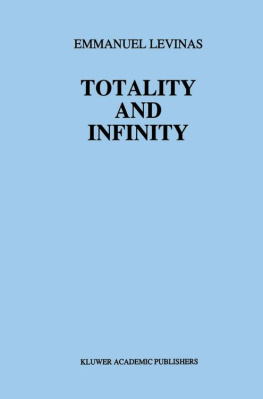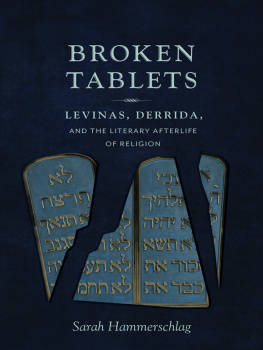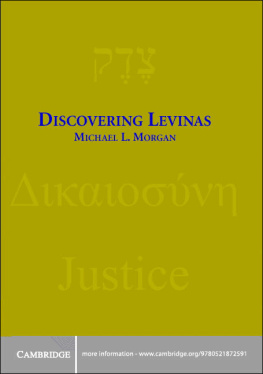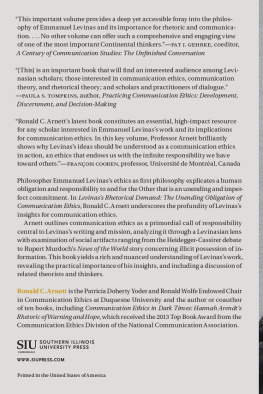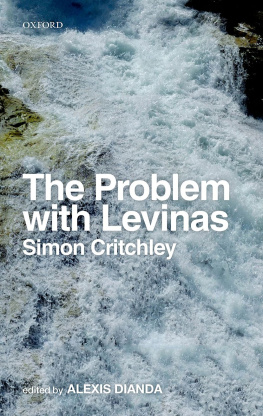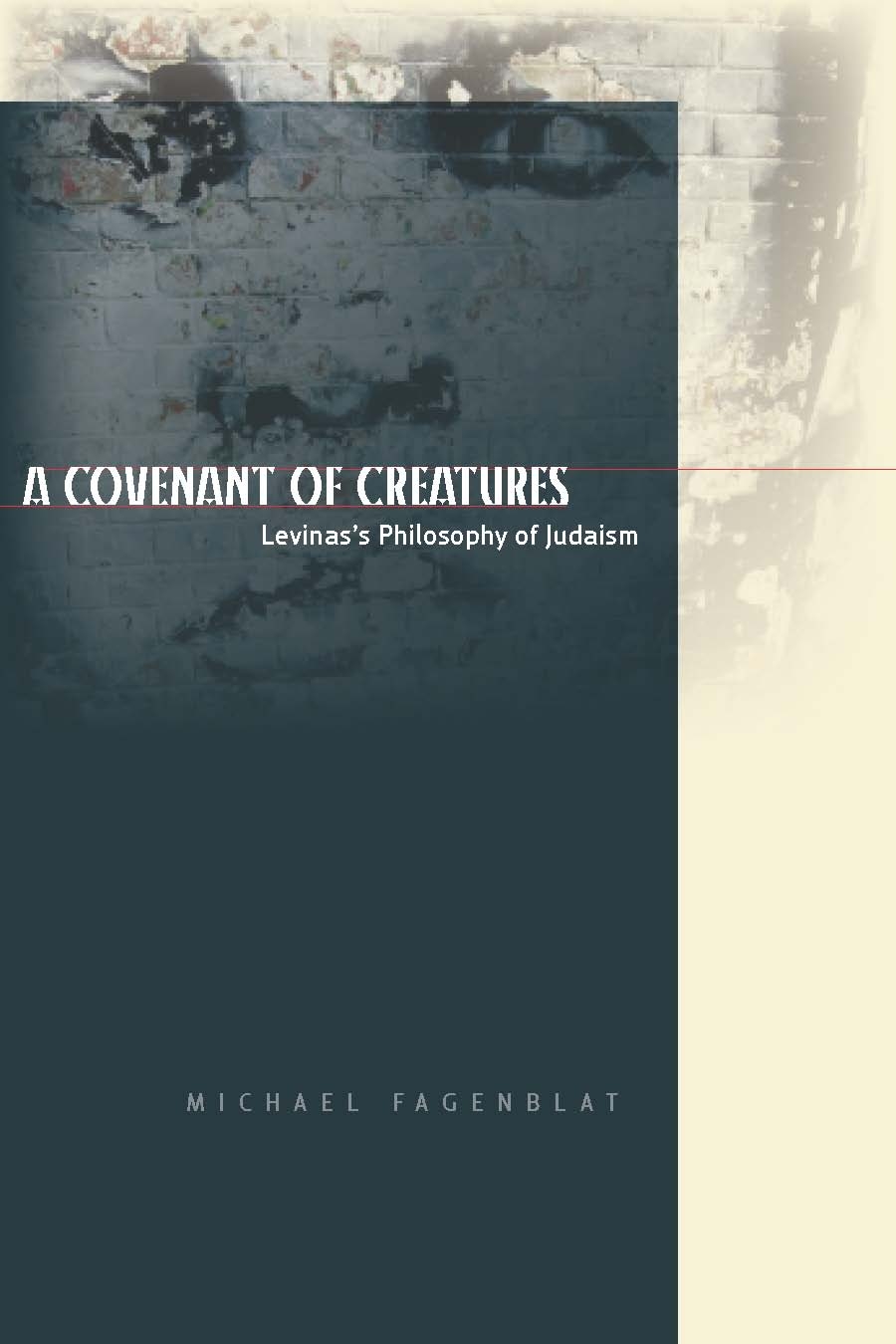Carl Schmitt, Political Theology , 36.
Otherwise than Being or Beyond Essence , xlii/ Autrement qutre ou au-del de lessence , x.
Interview with Raoul Mortley, Emmanuel Levinas, in Mortley, French Philosophers in Conversation , 13.
Howard Caygill, Levinas and the Political , offers a compelling explanation for the haunting presence of the Holocaust in Levinass thought. In Caygills view, the Holocaust, for Levinas, is the ever-present specter of political evil, not unlike the Hobbesian state of nature. Levinass account of ethics therefore is established on the basis of radical political evil but is also always haunted by it. In Caygills words, The political present is largely absent in Levinass texts, leaving marks as the memory of horror or the prophetic intimation of peace (3).
Levinas, The Theory of Intuition in Husserls Phenomenology .
Levinas, Some Thoughts on the Philosophy of Hitlerism, in Unforeseen History ; and Lactualit de Maimonide, trans. Michael Fagenblat as The Contemporary Relevance of Maimonides (1935).
Levinas, Il y a.
Salomon Malka, quoting Levinas on the occasion of his eightieth birthday, in his Emmanuel Levinas , 84. The summary I offer of Levinass Jewish life is largely taken from Malkas congenial biography.
Malka, Emmanuel Levinas , 132. One of Levinass final publications was a preface to a new French translation of Maimonides Book of Commandments , Le livre des commandments , 911.
These include the weekly reading of the Torah (the Pentateuch), repeated every year from beginning to end, the extensive selection of prophetic writings that accompany the weekly lection (the haftorah ), the additional exegesis and anthologization of the Bible that constitute a great part of the Jewish prayer book, and the further biblical texts (especially from the Hagiographa) and rabbinic glosses recited on Jewish festivals.
His first appointment was at Poitiers; his next was at the prestigious Nanterre (Paris X) from 19671973, when it was headquarters to the May 1968 uprising; and his last was at the Sorbonne (Paris IV). For more detail, see Marie-Anne Lescourret, Emmanuel Levinas , 22154, and Levinass brief but potent autobiographical sketch, Signature, in Difficult Freedom , 29195.
For a particularly lucid and succinct introduction, see Simon Critchley, Introduction, in Simon Critchley and Robert Bernasconi, eds., The Cambridge Companion to Levinas , 132.
Martin Heidegger, Being and Time , 323/SZ, 278. All references to Being and Time will appear in the text, followed by the page numbers in the German original of Sein und Zeit (Frankfurt am Main: Vittoria Klostermann, 1976) as SZ. One could say that Heidegger criticizes prevalent moral philosophies solely to expose the ethics of being , since the analysis of conscience (5560) is deployed entirely in order to explore the possibility of Daseins authentic attestation. In this respect Levinas, for whom the ethical response to the voice of the other provides the ultimate attestation of self, would be extremely close to Heidegger. These themes are explored in Franois Raffoul and David Pettigrew, eds., Heidegger and Practical Philosophy , especially in Jean-Luc Nancy, Heideggers Originary Ethics, 6586, Franoise Dastur, The Call of Conscience, 8798, and Raffoul, Heidegger and the Origins of Responsibility, 20518.
Heidegger, Being and Time , 59.
Even so, Levinass work has important affinities with several established positions in moral philosophy. I have mentioned its proximity to a Kantian sense of ethics as unconditioned obligation. It can also be noted that Totality and Infinity is a teleological, or at least an eschatological, work that could favorably compare to a certain Aristotelianism. I take it that Levinas generally distinguished between ethics and morality to differentiate what he was doing from Kantian Moralitt , or what is nowadays called value theory. A similar distinction between ethics and morality was introduced into analytical moral philosophy by Bernard Williams in Ethics and the Limits of Philosophy , 6. Williamss distinction between ethics and morality belongs to a shift among many analytic philosophers from Kantian and utilitarian theories of moral objectivity to Aristotelian-inspired accounts of ethical contextualism. The relationship between Levinass post-Heideggerian ethics and certain neo-Aristotelian analytic moral philosophers has not yet been sufficiently explored. For a helpful beginning, see Dwight Furrow, Against Theory , and Michael Morgan, Discovering Levinas , chap. 9, although I discovered Morgans book too late to incorporate it into this study.
All references to Totality and Infinity will be given in the body of this work as TI, followed by the pagination in the French original, Totalit et infini: Essai sur lexteriorit , as TeI.
Jacques Derrida, Violence and Metaphysics, in Writing and Difference , 111. Throughout the book, all emphasis in quotations is from the original unless stated otherwise.
All references to Otherwise than Being or Beyond Essence will be given in the body of this work as OB, followed by the pagination in the French original, Autrement qutre ou au-del de lessence , as AE.

